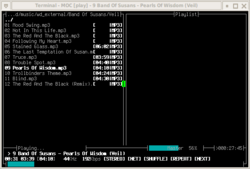- Music on Console
-
Music On Console 
Original author(s) Damian Pietras Initial release 2002 Stable release 2.4.4 / 2009-01-04 Preview release 2.5.0 alpha 4 / 2009-10-06 Written in C Operating system Linux/Unix Type Audio player License GNU General Public License Website http://moc.daper.net/ Music On Console (MOC) is an ncurses-based console audio player for Linux/UNIX written by Damian Pietras. It is designed to be powerful and easy to use, with a command structure and window layout inspired by the Midnight Commander console file manager.[1] It is very configurable, supporting ALSA, OSS or JACK outputs, customizable color schemes, interface layouts, key bindings, and tag parsing. MOC has a single playlist (which can be saved in m3u format) and has the concept of a 'music directory' but it has no library file where metadata is saved. Instead this information is read from the files themselves as needed upon access or during idle time. If the playlist has extended m3u information, that will be read.
Its text-only nature consumes very little system resources, and it uses an output buffer in a separate thread to avoid skipping under high system loads and to enable gapless playback. Normally, exiting the program only closes the interface - the program daemonizes itself so the music continues playing in the background.[2]
This client/server architecture is similar to MPD and XMMS2, but unlike those players, the MOC daemon is not accessible over a network, and does not have an open API to communicate with alternate clients. This has both advantages and disadvantages as, while MOC can't be controlled by a remote graphical client (it can, of course, be used via SSH), it can securely range the entire filesystem, which is not advisable by a remotely- and anonymously-accessible server such as MPD.
The binary is named mocp for "MOC Player" because of a conflict with a Qt utility called moc.
See also
- Comparison of audio player software
- Free audio software
- Linux audio software
- Music Player Daemon (MPD)
- cmus
External links

This free software-related article is a stub. You can help Wikipedia by expanding it.
